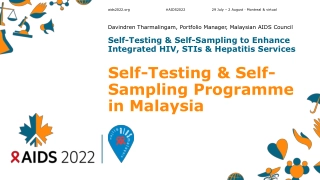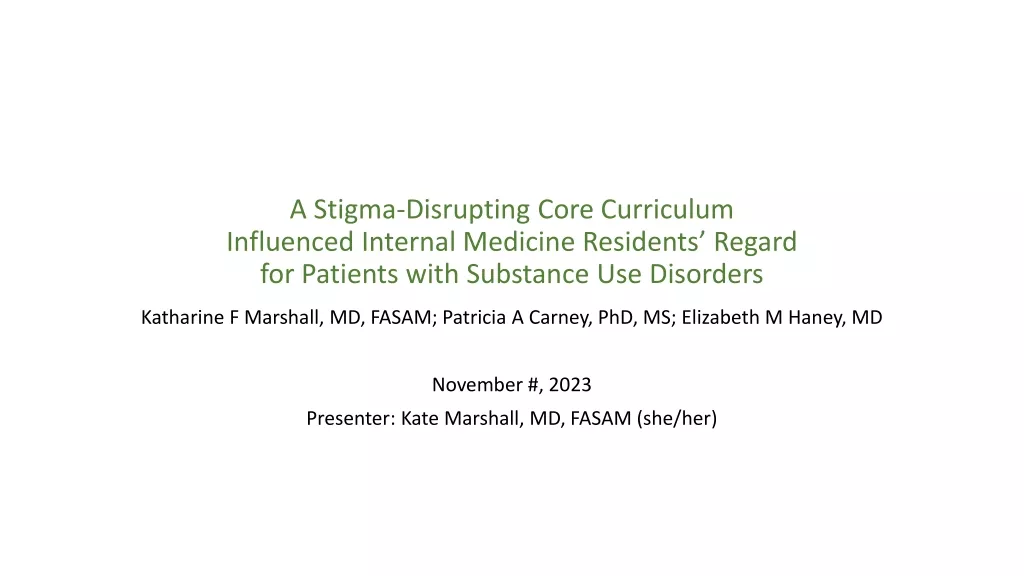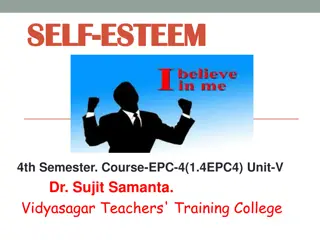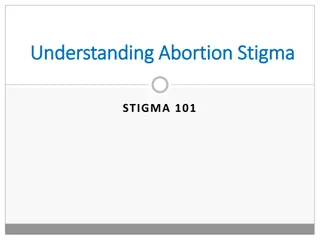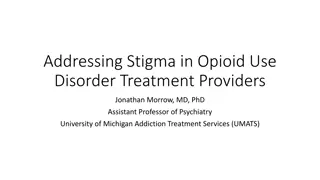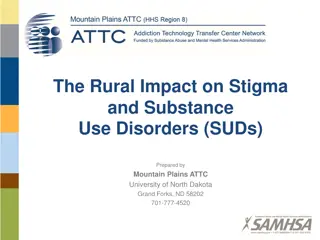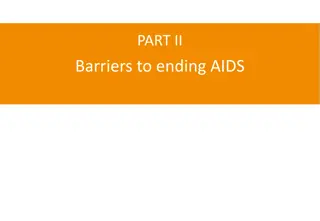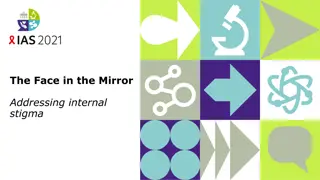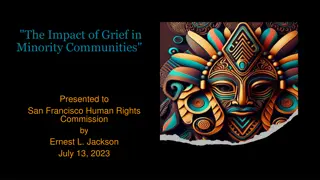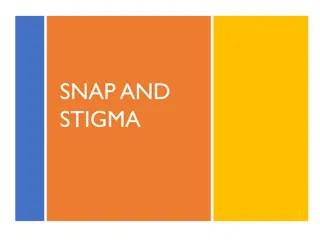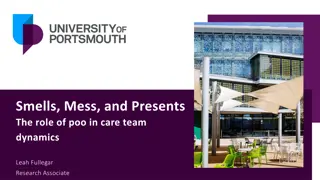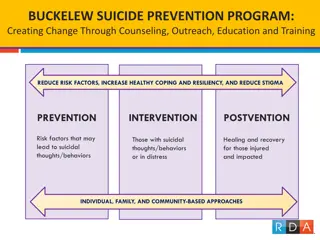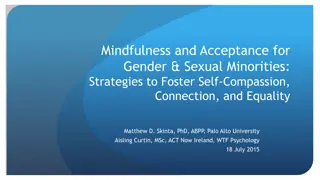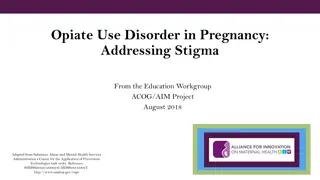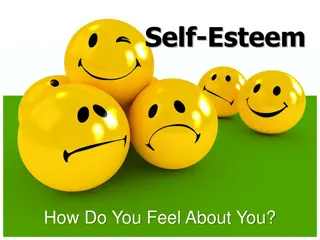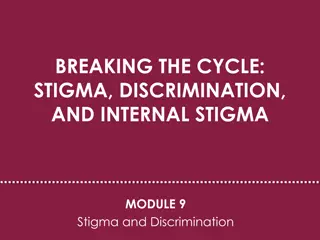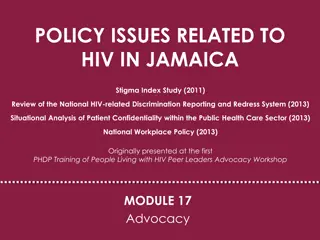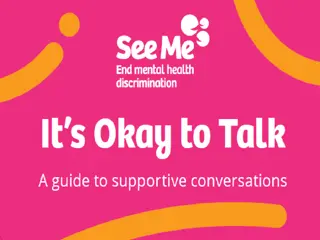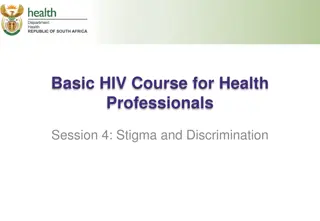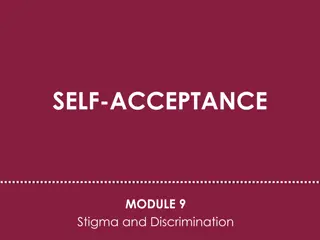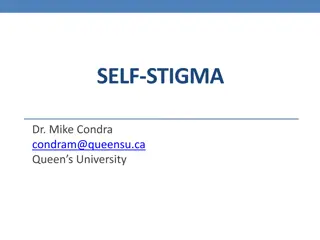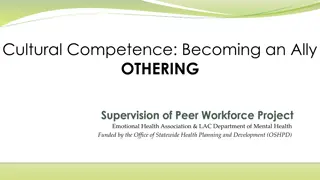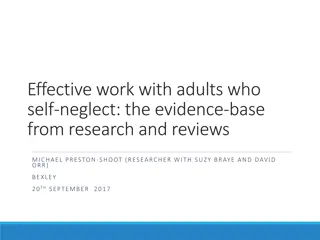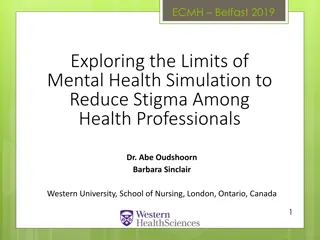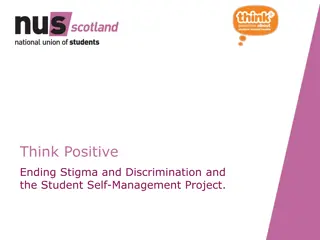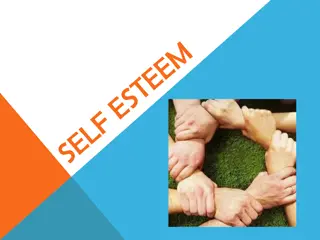Self-Testing & Self-Sampling Programme in Malaysia
The JOM.TEST Program in Malaysia offers fast, comforting, and confidential self-testing and self-sampling for vulnerable populations. It aims to combat stigma and discrimination and improve access to HIV, STIs, and hepatitis services.
2 views • 12 slides
Sex Worker Health & Harm Reduction 101
Barriers to care and stigma faced by sex workers. It offers insights on addressing trafficking, stigma, and promoting harm reduction. Explore narratives and sources shaping perceptions.
0 views • 28 slides
Understanding and Combatting Mental Health Stigma
Explore the WISE approach to reducing mental health stigma by increasing inclusion, hope, and support. Learn about the types of stigma, stigmatizing ideas and actions, self-stigma, and the ongoing impact of stigma on individuals. Discover how education can play a crucial role in changing societal vi
1 views • 29 slides
ERIKA'S.LIGHTHOUSE
This program, inspired by Erika who battled depression, aims to educate young people about depression, its symptoms, and stigma. It emphasizes the importance of seeking support, self-care, and understanding suicidal thoughts. The curriculum covers signs of depression, self-harm, and the impact of st
0 views • 15 slides
Enhancing Internal Medicine Residents' Approach to Patients with Substance Use Disorders
This study focuses on developing and implementing a stigma-disrupting curriculum to improve internal medicine residents' attitudes and knowledge regarding patients with substance use disorders. By addressing provider stigma and enhancing preparedness, the aim is to promote positive regard and increa
1 views • 27 slides
Exploring Mental Health Categories and Disorders
In today's categories, we delve into themes like stigma, recovery, myths, and facts surrounding mental health. We discuss various disorders including psychotic disorders and observable signs like hallucinations, delusions, and flat affect. Discover the signs and symptoms of mood disorders and high/l
1 views • 71 slides
Understanding Self-Worth in Children: Building a Strong Foundation
Explore the importance of self-concept, self-esteem, and self-worth in children's development. Learn how parents can positively impact a child's self-perception and self-value through nurturing experiences. Discover the key sources influencing children's self-worth and the critical role of early lif
0 views • 30 slides
Fighting Stigma in Schools: NAMI's Ending the Silence Program Overview
Testing the effectiveness of NAMI's Ending the Silence presentation in combating mental health stigma in schools. Developed in 2007, the program aims to educate students, reach out to communities, and provide support. With widespread implementation since 2014, it focuses on raising awareness, recogn
0 views • 21 slides
Understanding Self-Esteem: Meaning, Importance, and Types
Self-esteem is how we perceive our worth and value. High self-esteem leads to confidence and positivity, while low self-esteem can result in self-doubt and negative emotions. Self-esteem impacts mental health, behavior, decisions, relationships, and overall success in life. Recognizing and nurturing
2 views • 15 slides
Understanding Self-Esteem and Ways to Improve It
Self-esteem is our perception of ourselves, impacting how we navigate life. Healthy self-esteem fosters positivity, while low self-esteem can be detrimental. Various factors, like childhood experiences, contribute to low self-esteem, but steps can be taken to improve it. Building positive relationsh
0 views • 14 slides
Understanding Abortion Stigma - Insights and Implications
The content delves into the complexities of abortion stigma, exploring key definitions, effects of stigma on women's wellbeing, and reflections on its existence across time and location. It addresses why abortion is stigmatized, different levels of stigma, and the impact on individuals, communities,
0 views • 26 slides
Understanding and Addressing Stigma in Opioid Use Disorder Treatment Providers
This presentation by Dr. Jonathan Morrow highlights the stigma surrounding opioid use disorder treatment, focusing on identifying causes of stigma, using de-stigmatizing language, addressing stigmatizing behaviors, and reducing stigma at an institutional level. It discusses the types and effects of
0 views • 25 slides
Developing a Self-Care Action Plan for Overall Well-Being
Self-care involves deliberate activities to nurture mental, emotional, physical, and spiritual health, yet it is often neglected. This guide explores the essence of self-care, emphasizes the importance of building a personalized self-care action plan, and provides insights into taking care of your b
0 views • 19 slides
Understanding Poverty and Deviance: Stigma and Perspectives
Poverty is not just a lack of material resources but also a social stigma, often associated with immorality and failure. The relationship between poverty and deviance is complex, with societal perceptions shaping the experiences of those in poverty. From blaming the poor for their situation to socie
2 views • 16 slides
Impact of Stigma and Substance Use Disorders in Rural Areas
Rural communities face challenges related to stigma and substance use disorders, including limited transportation and treatment options. Stigma may be heightened in these areas due to privacy concerns and lack of confidentiality. Initiating evidence-based methods and implementing harm reduction stra
0 views • 14 slides
Challenges in Addressing HIV Stigma and Discrimination
Despite a decline in stigma associated with HIV, discriminatory attitudes persist globally, impacting access to healthcare and social inclusion. Data reveals variances in attitudes towards people living with HIV across different regions and highlights the need to address discrimination within health
0 views • 29 slides
Understanding Self-Stigma in HIV: Causes and Impacts
Self-stigma in the context of HIV involves negative beliefs, thoughts, and behaviors that can lead to shame, guilt, and self-rejection. This article explores the cycle of self-stigma, differences between stigma and discrimination, causes of self-stigma, and its impact on individuals. Addressing inte
0 views • 12 slides
Enhancing Self-Confidence for Professional Success
Understanding the importance of self-confidence in the workplace is crucial for personal growth and career advancement. Self-confident individuals trust their abilities, maintain a sense of control over their lives, and have realistic expectations. This summary delves into the characteristics of sel
0 views • 13 slides
The Impact of Grief in Minority Communities: Understanding Trauma, Grief, Loss, and Stigma
Exploring the emotional responses of trauma, grief, and loss in minority communities, this presentation sheds light on the physical, emotional, and behavioral symptoms associated with such experiences. It also delves into the stigma surrounding mental health in Black and Latinx communities, highligh
3 views • 24 slides
Addressing Stigma and Breaking Down Misconceptions about SNAP
Addressing stigma surrounding SNAP is crucial to ensure all eligible students can access this valuable resource. Stereotypes and misinformation often prevent individuals from utilizing SNAP benefits. By promoting positive messaging, correcting misinformation, and sharing personal stories, we can cha
3 views • 11 slides
Exploring Stigma in Early Detection of Psychosis Among Young People
This research focuses on stigma associated with identifying at-risk individuals for psychosis. It delves into the impact of societal perceptions on mental health outcomes, presenting findings from studies on public stigma, discrimination, and self-stigma. The study also examines how cultural factors
0 views • 46 slides
Enhancing Self-Regulation for Formative Assessment through Social and Emotional Learning
Explore the significance of self-regulation in formative assessment, understand key concepts like self-control, emotional competence, and perseverance. Discover actionable strategies to implement self-regulation interventions with students and train other adults effectively. Future orientation and s
0 views • 25 slides
Understanding Mindful Self-Judgment and Its Role in Mental Health
Mindful self-judgment is a complex concept that involves balancing self-awareness and self-compassion. While nonjudgment is a key aspect of mindfulness practices, there is a debate on whether mindful self-judgment can be appropriate and functional in certain circumstances. Researchers like June Pric
2 views • 46 slides
The Role of Poo in Care Team Dynamics: A Study on Stigma and Skillset in Care Homes
Research conducted by Leah Fullegar, a Research Associate, sheds light on how stigma around fecal incontinence is managed by care staff in care homes. Findings reveal skillset devaluation and challenges faced by care providers. The study discusses the importance of inclusivity and team cohesion in p
0 views • 6 slides
Suicide Prevention Program: Creating Change Through Counseling and Outreach
This program aims to reduce risk factors, increase healthy coping mechanisms, and decrease stigma associated with suicidal thoughts and behaviors. It focuses on individual, family, and community-based approaches to help those in distress, promote healing and recovery, and provide necessary support a
0 views • 41 slides
Strategies for Self-Compassion and Equality in Gender and Sexual Minorities
This content discusses mindfulness and acceptance strategies to foster self-compassion, connection, and equality for gender and sexual minorities. It emphasizes the importance of understanding personal histories and breaking free from societal stigma to access freedom and peace. The text also touche
0 views • 16 slides
Understanding Stigma in Opioid Use Disorder During Pregnancy
Stigma plays a detrimental role in Opioid Use Disorder (OUD) during pregnancy, leading to fear of judgment and hindering individuals from seeking help. This stigma can result in dropping out of treatment programs and societal exclusion. Substance use disorder, including OUD, is highly stigmatized, a
0 views • 24 slides
Understanding Self-Esteem: Highs and Lows
Self-esteem is the judgment we hold about ourselves, shaped by experiences and relationships. High self-esteem individuals embrace new encounters with confidence and positivity, while low self-esteem individuals struggle with self-doubt and criticism. Recognizing signs of low self-esteem is crucial
0 views • 11 slides
Understanding Stigma, Discrimination, and Internal Stigma
Stigma is the devaluation of individuals based on specific attributes such as race, HIV status, or gender, leading to discrimination and internalized feelings of shame and worthlessness. HIV-related stigma, discrimination, and internal stigma can have detrimental effects on individuals and communiti
0 views • 12 slides
HIV-Related Stigma and Discrimination in Jamaica: A Policy Review
Conducted in 2011 and 2013, this study in Jamaica explores the stigma, discrimination, and support experiences of individuals living with HIV. Findings highlight high levels of internalized stigma, experiences of exclusion and harassment, and challenges in disclosure. The study also assesses support
0 views • 38 slides
Supportive Conversations Workshop: Understanding Mental Health Stigma
Explore the concepts of mental health stigma and discrimination in a workshop setting. Gain awareness of the impact of stigma, feel more confident in discussing mental health, and create a safer space for open dialogue. Learn to challenge stigma and discrimination, and hear personal experiences that
0 views • 36 slides
Boosting Your Child's Self-Esteem & Confidence in Parenting Workshop Series
Understanding self-esteem in children is crucial for their emotional development. Healthy self-esteem leads to positive behaviors, while low self-esteem can result in negative self-perceptions. Recognizing signs of healthy and unhealthy self-esteem allows parents to support and nurture their child's
0 views • 11 slides
Understanding HIV-Related Stigma and Discrimination
This session covers the definition and types of stigma and discrimination related to HIV/AIDS, along with the impact on people living with HIV/AIDS (PLWHA). Participants will also learn strategies to address stigma and its effects on prevention and treatment efforts, emphasizing the need to combat s
0 views • 10 slides
Understanding Self-Acceptance and Overcoming Stigma
Self-esteem and self-acceptance are distinct concepts, with self-acceptance focusing on embracing all facets of oneself unconditionally. Developing self-acceptance involves stages like aversion, curiosity, tolerance, and allowing. Overcoming avoidance and resistance can lead to self-compassion and g
0 views • 10 slides
Understanding and Addressing Self-Stigma in Mental Health
Explore the concept of self-stigma in mental health through activities and discussions, learn about the impact of self-stigma, and discover how peer mentors can help mitigate its effects. Delve into the definitions of stigma, stereotypes, prejudice, and discrimination, as well as their implications
0 views • 25 slides
Understanding Othering and Stigma in Mental Health
Explore the concepts of othering, stigma, and emotional health in the context of mental health awareness. Reflect on early childhood experiences of being othered, the impact of stigma, and personal encounters with feeling stigmatized. Delve into discussions on empathy and understanding towards those
0 views • 7 slides
Understanding Self-Neglect in Adults: Challenges and Research Insights
This content delves into the complex issue of self-neglect in adults, covering its definition, key challenges, and the research evidence available. It explores the various aspects of self-neglect, including neglect of self-care, domestic environment, and refusal of services. The challenges associate
0 views • 39 slides
Examining Mental Health Simulation's Impact on Reducing Stigma Among Health Professionals
Mental health care perception among nursing students is often negative, with simulation proving beneficial in teaching task-based aspects. Real-world practice also helps reduce stigma. The study explores if exposure to standardized patients acting out mental health challenges can decrease stigma lev
0 views • 11 slides
Ending Stigma and Discrimination in Student Mental Health Project
Think Positive is a Scottish Government-funded project at NUS Scotland aiming to improve student mental wellbeing and tackle the stigma associated with mental health issues among students. Through surveys and research, they discovered instances of unfair treatment, impacting students' lives and wors
0 views • 15 slides
Boosting Self-Esteem: Benefits and Tips for Improvement
Understanding self-esteem, its benefits, and risks of low self-esteem are essential for personal growth. Developing high self-esteem can lead to increased self-respect, goal achievement, and willingness to try new things. On the other hand, low self-esteem can make individuals vulnerable to peer pre
0 views • 10 slides
